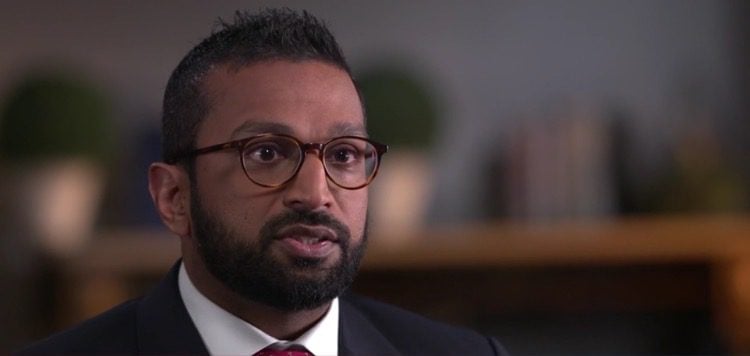
In Final Days, Trump Gave Up on Forcing Release of Russiagate Files, Nunes Prober Says
Kash Patel This article was republished with permission from Real Clear Investigations By investigative journalist Aaron Maté In Final Days, Trump Gave Up on Forcing Release of Russiagate Files, Nunes Prober Says After four years of railing against “deep state” actors who, he said, tried to...
By Jim Hoft
Published February 25, 2021 at 11:15am
910 Comments
Share(179)TweetShare to GabTelegramShareEmail

This article was republished with permission from Real Clear Investigations
By investigative journalist Aaron Maté
In Final Days, Trump Gave Up on Forcing Release of Russiagate Files, Nunes Prober Says
After four years of railing against “deep state” actors who, he said, tried to undermine his presidency, Donald Trump relented to U.S. intelligence leaders in his final days in office, allowing them to block the release of critical material in the Russia investigation, according to a former senior congressional investigator who later joined the Trump administration.
TRENDING: BREAKING EXCLUSIVE: Police Lieutenant Who Shot and Killed Ashli Babbitt - Lead Murder Suspect in Ashli Babbitt Case
Kash Patel, whose work on the House Intelligence Committee helped unearth U.S. intelligence malpractice during the FBI’s Crossfire Hurricane probe, said he does not know why Trump did not force the release of documents that would expose further wrongdoing. But he said senior intelligence officials “continuously impeded” their release – usually by slow-walking their reviews of the material. Patel said Trump’s CIA Director, Gina Haspel, was instrumental in blocking one of the most critical documents, he said.
Patel, who has seen the Russia probe’s underlying intelligence and co-wrote critical reports that have yet to be declassified, said new disclosures would expose additional misconduct and evidentiary holes in the CIA and FBI’s work.
“I think there were people within the IC [Intelligence Community], at the heads of certain intelligence agencies, who did not want their tradecraft called out, even though it was during a former administration, because it doesn’t look good on the agency itself,” Patel told RealClearInvestigations in his first in-depth interview since leaving government at the end of Trump’s term last month, having served in several intelligence and defense roles (full interview here).
Trump did not respond to requests seeking comment sent to intermediaries.
Although a Department of Justice inspector general’s report in December 2019 exposed significant intelligence failings and malpractice, Patel said more damning information is still being kept under wraps. And despite an ongoing investigation by Special Counsel John Durham into the conduct of the officials who carried out the Trump-Russia inquiry, it is unclear if key documents will ever see the light of day.
Patel did not suggest that a game-changing smoking gun is being kept from the public. Core intelligence failures have been exposed – especially regarding the FBI’s reliance on Christopher Steele’s now debunked dossier to secure FISA warrants used to surveil Trump campaign adviser Carter Page. But he said the withheld material would reveal more misconduct as well as major problems with the CIA’s assessment that Russia, on Vladimir Putin’s orders, ordered a sweeping and systematic interference 2016 campaign to elect Trump. Patel was cautious about going into detail on any sensitive information that has not yet been declassified.
‘Continuously Impeded’ in Public Disclosure
Patel’s work on the House Intelligence Committee, under the leadership of its former Republican chairman, Devin Nunes, is widely credited with exposing the FBI’s reliance on Steele and misrepresentations to the FISA court. Yet congressional Democrats and major media outlets portrayed him as a behind-the-scenes saboteur who sought to “discredit” the Russia investigation.
The media vitriol unnerved Patel, who had previously served as a national security official in the Obama-era Justice Department and Pentagon – a tenure that exceeds his time working under Trump. Patel says that ensuring public disclosure of critical information in such a consequential national security investigation motivated him to take the job in the first place.
“The agreement I made with Devin, I said, ‘Okay, I don’t really want to go to the Hill, but I’ll do the job on one basis: accountability and disclosure,” Patel said. “Everything we find, I don’t care if it’s good or bad or whatever, from your political perspective, we put it out.’ So the American public can just read it themselves, with a few protections here and there for some certain national security measures, but those are minimal redactions.”
That task proved difficult. The House Intelligence Committee’s disclosure efforts, Patel said, “were continuously impeded by members of the intelligence community themselves, with the same singular epithets that you’re going to harm sources and methods. … And I just highlight that because, we didn’t lose a single source. We didn’t lose a single relationship, and no one died by the public disclosures we made because we did it in a systematic and professional fashion.”
“But each time we forced them to produce [documents],” Patel added, “it only showed their coverup and embarrassment.” These key revelations he helped expose include Justice official Bruce Ohr’s admission that he acted as a liaison to Steele even after the FBI officially terminated him; former FBI Deputy Director Andrew McCabe’s false statements about leaks related to the Hillary Clinton email investigation; and the FBI’s reliance on the Steele dossier to spy on Page. “There is actually a law that prevents the FBI and DOJ from failing to disclose material to a court just to hide an embarrassment or mistake, and it came up during our investigation. It helped us compel disclosure.”
Assessing the ‘Intelligence Community Assessment’
For Patel, a key document that remains hidden from the public is the full report he helped prepare and which Trump chose not to declassify after pressure from the intelligence community: The House Intelligence Committee report about the January 2017 Intelligence Community Assessment (ICA).
The ICA is a foundational Russiagate document. Released just two weeks before Trump’s inauguration, it asserted that Russia waged an interference campaign to help defeat Hillary Clinton. Despite widespread media accounts that the ICA reflected the consensus view of all 17 U.S. intelligence agencies, it was a rushed job completed in a few weeks by a small group of CIA analysts led by then-CIA Director John Brennan, who merely consulted with FBI and NSA counterparts. The NSA even dissented from a key judgment that Russia and Putin specifically aimed to help install Trump, expressing only “moderate confidence.”
The March 2018 House report found that the production of the ICA “deviated from established CIA practice.” And the core judgment that Putin sought to help Trump, the House report found, resulted from “significant intelligence tradecraft failings that undermine confidence in the ICA judgments.”
Along with that March 2018 report, Patel and his intelligence committee colleagues produced a still-classified document that fleshed out the ICA’s “tradecraft failings” in greater detail.
“We went and looked at it [the ICA], and looked at the underlying evidence and cables, and talked to the people who did it,” Patel says. According to Patel, the ICA’s flaws begin with the unprecedentedly short window of time in which it was produced during the final days of the Obama White House. “In two to three weeks, you can’t have a comprehensive investigation of anything, in terms of interference and cybersecurity matters.”

